|
|
|
Sort Order |
|
|
|
Items / Page
|
|
|
|
|
|
|
| Srl | Item |
| 1 |
ID:
072521


|
|
|
|
|
| Publication |
London, Tauris Academic Studies, 2006.
|
| Description |
viii, 238p.Hbk
|
| Standard Number |
1845110366
|
|
|
|
|
|
|
|
|
|
|
|
Copies: C:1/I:0,R:0,Q:0
Circulation
| Accession# | Call# | Current Location | Status | Policy | Location |
| 051365 | 700.94109044/WEI 051365 | Main | On Shelf | General | |
|
|
|
|
| 2 |
ID:
090559
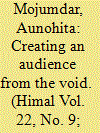

|
|
|
|
|
| Publication |
2009.
|
| Summary/Abstract |
Contrary to the oft-repeated mantra that equates all censorship with the Taliban, the advent of cultural restrictions in Afghanistan goes back much farther. While the Soviet-sponsored regimes saw a chance for propaganda in art and music, the subsequent mujahideen government had senior leaders whose conservative interpretation of Islam did not encourage music and the arts. What space remained was squeezed in the last years of the Taliban, when its leaders turned more brutal and censorious, systematically destroying the art and culture that they had earlier permitted to exist. The purge culminated in the infamous destruction of the Bamiyan Buddhas, an act that turned the Taliban into pariahs. But Bamiyan residents still talk of how, in earlier years, the mujahideen soldiers would amuse themselves by taking pot shots at the Buddha statues.
|
|
|
|
|
|
|
|
|
|
|
|
|
|
|
|
| 3 |
ID:
179367
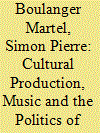

|
|
|
|
|
| Summary/Abstract |
This article investigates the role of cultural production as a practice with important implications for rebel legitimacy. Cultural production is employed to bolster rebel group legitimacy internally, by justifying existing hierarchical relations between the leadership and fighters, and externally by positioning the rebel group as a legitimate alternative to established elites and a rightful representative of the people. Building on a relational approach to armed groups legitimacy, the article analyses cultural production by the Fuerzas Armadas Revolucionarias de Colombia (FARC). The analysis draws on FARC music production from 1988 to 2019, internal documents, artists’ testimonies, and field observations from 2017.
|
|
|
|
|
|
|
|
|
|
|
|
|
|
|
|
| 4 |
ID:
151565


|
|
|
|
|
| Summary/Abstract |
Around the world, music serves as an important element of mobilisation for social movements. Singing songs is not only a peaceful protest technique but also helps to construct a protest identity locating and relating the social movement to its political and social environment. Most importantly, a social movement is to a significant extent remembered through its music, and this determines its future impact on local (contentious) politics. Against this backdrop, this article seeks to understand Hong Kong’s Umbrella Movement through four YouTube music videos, analysing the lyrics, music, and video imagery in order to carve out core elements and values of the Umbrella Movement. Especially given the importance of Hong Kong’s identity as a “global” city with a cosmopolitan culture and past, the peaceful nature of the movement and the rise of a xenophobic localism in the shape of sarcasm are emphasised.
|
|
|
|
|
|
|
|
|
|
|
|
|
|
|
|
| 5 |
ID:
125181


|
|
|
|
|
| Publication |
2013.
|
| Summary/Abstract |
The introduction of the long-playing record in 1948 was the most aesthetically significant technological change in the century of the recorded music disc. The new format challenged record producers and recording artists of the 1950s to group sets of songs into marketable wholes and led to a first generation of concept albums that predate more celebrated examples by rock bands from the 1960s. Two strategies used to unify concept albums in the 1950s stand out. The first brought together performers unlikely to collaborate in the world of live music making. The second strategy featured well-known singers in songwriter-or performer-centered albums of songs from the 1920s, 1930s, and 1940s recorded in contemporary musical styles. Recording artists discussed include Fred Astaire, Ella Fitzgerald, and Rosemary Clooney, among others.
|
|
|
|
|
|
|
|
|
|
|
|
|
|
|
|
| 6 |
ID:
189698
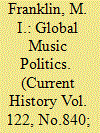

|
|
|
|
|
| Summary/Abstract |
Music and politics have always been closely intertwined. Throughout history, political regimes have appropriated musical works for their own purposes, while musicians have expressed their own political views through their work—whether in the lyrics or in the music itself. Some pieces have become closely associated with certain political events, such as the fall of the Berlin Wall. Today, digital streaming services have brought a vast menu of global musical choices to consumers, but algorithmic recommendations could shape playlists in ways that serve political agendas or reinforce Western conventions.
|
|
|
|
|
|
|
|
|
|
|
|
|
|
|
|
| 7 |
ID:
125179


|
|
|
|
|
| Publication |
2013.
|
| Summary/Abstract |
The role of Hollywood films in holding up a mirror-albeit sometimes a distorted one-to the American public is indisputable. Less discussed is their role in bringing a wide range of music-popular, classical, jazz, avant-garde, ethnic-to an unsuspecting audience. Whether the music is in the foreground, as in biographical movies about composers, for example, or in the background supporting the narrative, watching a movie educates the viewers' ears. Indeed, the role of movies in widening the public's aural palate has parallels with the role of art museums in broadening the public's visual taste. To supply the music needed for movies, Hollywood studios have employed a large number of composers of the most varied backgrounds, taking on a significant function as patron of contemporary music. This essay briefly examines some of the varied interactions of movies, music, and the public.
|
|
|
|
|
|
|
|
|
|
|
|
|
|
|
|
| 8 |
ID:
125176
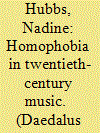

|
|
|
|
|
| Publication |
2013.
|
| Summary/Abstract |
Challenging notions of the composer as solitary genius and of twentieth-century homophobia as a simple destructive force, I trace a new genealogy of Coplandian tonal modernism-"America's sound" as heard in works like "Rodeo," "Appalachian Spring," and "Fanfare for the Common Man" - and glean new sociosexual meanings in "cryptic" modernist abstraction like that of Gertrude Stein and Virgil Thomson's opera "Four Saints in Three Acts." I consider gay white male tonalists collectively to highlight how shared social identities shaped production and style in musical modernism, and I recast gay composers' close-knit social/sexual/creative/professional alliances as, not sexually nepotistic cabals, but an adaptive and richly productive response to the constraints of an intensely homophobic moment. The essay underscores the pivotal role of the new hetero/homo concept in twentieth-century American culture, and of queer impetuses in American artistic modernism.
|
|
|
|
|
|
|
|
|
|
|
|
|
|
|
|
| 9 |
ID:
188745


|
|
|
|
|
| Summary/Abstract |
This essay offers an introduction to a special section on ecology and performance in South Asia. Aiming at ‘green’ studies of music and performance, this collection explores intersections between ethnography, history, eco- and ethnomusicology, and film and performance studies by paying particular attention to the ecological turn more broadly visible in South Asian studies. The papers address varied ecological settings of South Asian music and performance, from riverscapes to coastal communities, and from the locations of instrument-makers to negotiations of the climate crisis and the COVID-19 pandemic. The novelty of the section lies not just in mapping the dialogism between ecology and music through reflections on liminality, gender, resistance and identity, but also in bringing forth new archival strategies (digitisation and digital cultures) in conversation with ethnographic findings.
|
|
|
|
|
|
|
|
|
|
|
|
|
|
|
|
| 10 |
ID:
177708
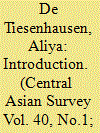

|
|
|
|
|
| Summary/Abstract |
Central Asian art and culture have been gaining increased attention both within the region and on the international scene. This special issue brings together scholars and participants in the Central Asian cultural scene who specialize in different, often isolated, spheres. This multidisciplinary approach will enhance understanding of the current trends of display, presentation, accessibility and analysis that relate to individual countries, as well as to the entire region. Some articles are by established scholars; most have resulted from extensive field research. The papers question existing notions of history and memory production by applying a decolonial discourse. Ultimately, the main unifying theme is that of identity and its formation, including national, ethnic, cultural, religious and gender. The main purpose of this special issue is to try to understand the role the cultural scene plays in society, the issues raised by cultural production and the shape it could take. The collection of papers here seeks to explore whether culture offers a representation of society and its potential for change, or the vehicle through which such change can be achieved.
|
|
|
|
|
|
|
|
|
|
|
|
|
|
|
|
| 11 |
ID:
143104
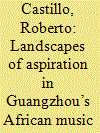

|
|
|
|
|
| Summary/Abstract |
This article is an exploration into the personal aspirations that converge in Guangzhou’s African music scene. I argue that despite being often traversed, articulated, fuelled, and constrained by economies and economic discourses, aspirations are not necessarily economic or rational calculations. I contend that the overarching trading narrative about “Africans in Guangzhou” has left little space for issues of agency, emotion, and aspiration to be considered in their own right. Drawing on a year of continuous ethnographic fieldwork, I show how aspirations are crucial arenas where the rationales behind transnational mobility are developed, reproduced, and transmitted. Indeed, aspirations can be thought of as “navigational devices” (Appadurai 2004) that help certain individuals reach for their dreams. By bringing the analysis of aspirations to the fore, I intend to provide a more complex and nuanced landscape of the multiple rationales behind African presence in Southern China; promote a better understanding (both conceptually and empirically) of how individuals navigate their social spaces and guide their transnational journeys; and draw attention to the incessant frictions and negotiations between individual aspirations while on the move and the constraints imposed by more structural imperatives.
|
|
|
|
|
|
|
|
|
|
|
|
|
|
|
|
| 12 |
ID:
125182


|
|
|
|
|
| Publication |
2013.
|
| Summary/Abstract |
Just before he died in 1943, Fats Waller wrote the music for a Broadway book musical with a mostly white cast, the first black composer to do so-and the only one ever to do it with commercial success. Yet "Early to Bed" is largely ignored by historians of musical theater, while jazz scholars describe the circumstances surrounding its composition rather than the work itself. Encouraging this neglect is the fact that no actual score survives. This essay, based on research that assembled all surviving evidence of the score and the show, gives a summary account of "Early to Bed" and what survives from it. The aim is to fill a gap in Waller scholarship, calling attention to some of his highest quality work, and possibly stimulating further reconstruction work that might result in a recording of the score.
|
|
|
|
|
|
|
|
|
|
|
|
|
|
|
|
| 13 |
ID:
153654


|
|
|
|
|
| Summary/Abstract |
This paper is an ethnomusicological and media studies collaborative study that discusses the politics of representation on media health images, especially HIV/AIDS in Africa, and how a South African AIDS support group and choral ensemble offers a counter-narrative to the images that are seen in the Western media. Using ethnographic data on the group’s organization, music events, and interviews with choir members, we argue that Siphithemba Choir’s story is a narrative of self-representation that subverts the appropriation of their story by the scientific community, and counters the helpless image of HIV-infected individuals that often comprise the face of HIV/AIDS in Africa in the mainstream media.
|
|
|
|
|
|
|
|
|
|
|
|
|
|
|
|
| 14 |
ID:
090588


|
|
|
|
|
| Publication |
2009.
|
| Summary/Abstract |
Greater Osaka, a hub of commerce and industrial production during the interwar period, was the site for rapid development of diaspora communities, whose significant contribution to the regional music-culture has been little documented. This article describes three contexts for music-making among the largest ethnic minorities, the Koreans and Okinawans, on the basis of primary textual, oral and musical sources, as well as an emerging body of writings on Okinawan music in Osaka. People from Korea and Okinawa were involved in the broader musical life of the metropolis in diverse ways, as professional performers, and as producers and consumers of recordings. The reception of such 'foreign' music and musicians reflected the status accorded them in the colonial system and its underlying racial ideology.
|
|
|
|
|
|
|
|
|
|
|
|
|
|
|
|
| 15 |
ID:
119162


|
|
|
| 16 |
ID:
178460
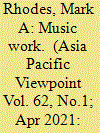

|
|
|
|
|
| Summary/Abstract |
Recent scholarship has opened questions as to the everyday actions of the Khmer Rouge and those living under the regime which led to the Cambodian Genocide. Current work examines the critical cultural geographies of the Khmer Rouge: photography, poetry and music, for example. Music specifically has an interesting underpinning, as it was previously understood to be have been eradicated in the genocide as the standard narrative has us believe. This paper instead investigates the pieces of evidence that exist, which explain the use of music by the Khmer Rouge. I explore the geographies of music beyond the lyrics and look at the transformation and use of music in Cambodia and Democratic Kampuchea. What elements of traditional Khmer music were used during the regime? What modifications occurred to the music of Cambodia during the regime, and how did the Khmer Rouge modify existing Cambodian (and other) music to best fit their desired uses (state-building and genocide)? This paper goes beyond traditional geographies of music, which rely on lyrical analyses, to bring an ethnomusicological perspective to the work of music and its role in shaping the idea of the Democratic Republic of Kampuchea.
|
|
|
|
|
|
|
|
|
|
|
|
|
|
|
|
| 17 |
ID:
186575
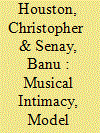

|
|
|
|
|
| Summary/Abstract |
Niyazi Sayın is an Istanbul-born ney (reed flute) virtuoso, and the most acclaimed musician of a musical tradition controversially called “Ottoman-Turkish classical music.” Now 94 years old, Sayın has been called insan-i kamil (a perfect human), kutb-ı nayi, (the musical spiritual axis of his age), and hezarfen (master of a thousand arts). What do such titles mean? Building upon the work of Martin Stokes on popular music and its fashioning of intimate publics, this paper explores Sayın's musical life. We argue that it provides an exemplary expression of cultural intimacy for listeners and students, one that (as reflected in his titles) demonstrates a particular way of becoming a person, a Muslim, and a model citizen. In contrast with more official constructions of citizenship, as well as with the political neo-Ottomanism of the Justice and Development Party (AKP), Sayın's life and music open up alternative possibilities of self-alteration for those who engage with it.
|
|
|
|
|
|
|
|
|
|
|
|
|
|
|
|
| 18 |
ID:
092969


|
|
|
|
|
| Publication |
2009.
|
| Summary/Abstract |
Increasing attention is being paid to how workers in the creative industries negotiate transitions from amateur to professional status and seek opportunities for work and spaces for expression that suit artistic desires. The settings have usually been large cities with populations that can support diverse and specialised audiences and subcultural scenes. In this paper, we discuss research where we participated in a music scene, and talked to dance music disc jockeys and venue owners in a small, regional university city - Dunedin. In Dunedin opportunities for musical work are comparatively plentiful but are constrained in a number of ways. Disc jockeys negotiate audience demands, distances from key musical centres and associated infrastructure, and the shifting venues available for performance. We emphasise the importance of an ethnographic perspective to the study of musical work that remains attuned to the manner in which urban spaces are created, transformed, challenged and remade in the musical nightlife economy.
|
|
|
|
|
|
|
|
|
|
|
|
|
|
|
|
| 19 |
ID:
173001


|
|
|
|
|
| Summary/Abstract |
Although the case of “censorship” of Chinese hip-hop in January 2018 has led to extensive news coverage in the international press, it does not account for the multiple forms of musical censorship that exist in contemporary China. This article draws on observations from within the punk rock community to outline how censorship works in practice and which institutions are responsible for overseeing musical productions, from the release of albums to the management of concerts and festivals. This overview of censorship mechanisms in the Chinese music scene – including self-censorship required to release albums domestically – will highlight how to circumvent censorship, as well as the extent to which it is possible for artists to negotiate with the authorities.
|
|
|
|
|
|
|
|
|
|
|
|
|
|
|
|
| 20 |
ID:
125183
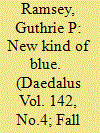

|
|
|
|
|
| Publication |
2013.
|
| Summary/Abstract |
This essay places the important Robert Glasper Experiment recording "Black Radio" (2012) within its artistic, commercial, and critical contexts. As a project that combines genres, "Black Radio" did more than challenge different communities of listeners; it invited them to see how Glasper's sonic juxtapositions could be logically aligned. Jazz, hip-hop, R&B, and gospel merge in "Black Radio" to form a stylish, forward-looking contribution that won popular and critical successes. Glasper and his ensemble toy with the social contracts that have established boundaries around sonic language; indeed, he makes their territories feel seamless and natural. Because of the success of the project, we may be witnessing a post-genre moment that disrupts traditional ideas about music that have been preciously held in the industry since it emerged in the late-nineteenth century.
|
|
|
|
|
|
|
|
|
|
|
|
|
|
|
|
|
|
|
|
|